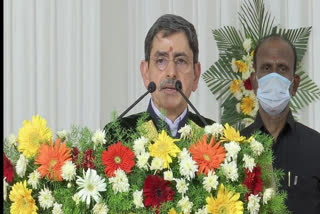Chennai: In an unusual confrontation with the state government, Tamil Nadu Governor RN Ravi has not given his assent to the Bill to ban online gambling games, allowing an Ordinance that was promulgated earlier for this purpose to lapse on Sunday. Unlike 20 other Bills pending for his assent, including a few stripping the governor from the post of Chancellor of state-run Universities, this is a legislation which has received support, cutting across party-lines.
Last week, Raj Bhavan raised certain queries on the Bill and the government has said that it had submitted the necessary clarifications. With the Governor yet to make up his mind, the government is miffed over the inordinate delay. The ruling DMK was forced to bring this legislation as well as the earlier ordinance following persistent demand from political parties due to the frequent suicides by those addicted to online gambling.
As per the legislation, those participating in online gambling like rummy and poker will be punished with imprisonment for three months or a penalty of Rs 5000. While those advertising could be put behind the bars for one year, those organizing it would be jailed for three years. Meanwhile, Madras High Court dismissed a plea challenging the ordinance, after the government submitted that it has not come into effect.
The State cabinet cleared the Ordinance on September 26 and the Governor promulgated it on October 1. Subsequently, it was published in the gazette on October 7, but the rules were not framed. In order to replace it, the Assembly passed the Bill on October 19, at its last session. Usually, an Ordinance is valid for six months and has to be replaced by legislation. But, if an Assembly is convened afterwards, the ordinance will lapse 3 weeks after the session. This is what has happened in this instance.
The previous AIADMK regime too had brought a legislation which was struck down by Madras high Court and upheld by the Supreme Court, necessitating the new legislation with inputs from a panel headed by Justice (retd) K Chandru of Madras High Court. According to a government survey, 74 per cent of teachers have admitted that online games adversely affected the focus of students and another 64 per cent saying that students were having severe eyesight problems.
